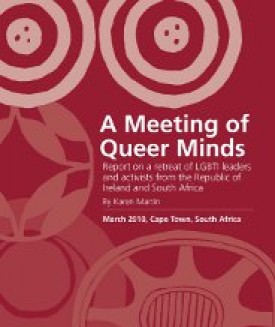A Meeting of Queer Minds
Resource type: Research Report
Karen Martin |
This report covers the exchange, key learnings and recommendations of leaders and activists from Irish and South African organisations representing lesbian, gay, bisexual, transgender and intersex people (LGBTIs) at a retreat, sponsored by Atlantic, near Cape Town in March 2010.
Introduction
In March 2010, The Atlantic Philanthropies (AP) hosted an exchange between leadership and activists from Irish and South African organisations representing lesbian, gay, bisexual, transgender and intersex people (LGBTIs) at Hout Bay near CapeTown in South Africa.
“In South Africa, there was the transition from apartheid to democracy, starting in 1994, with a new Constitution guaranteeing equality before the law for all marginalised groups, including LGBTIs.”
Since 2001, AP has been a major supporter of LGBTI organisationsin both the Republic of Ireland and South Africa, following a strategic scoping exercise that identified the need to promote and support full citizenship for LGBTIs in both countries.The exercise found that LGBTI communities were politically marginal in terms of access to human and socio-economic rights.
In both countries, AP support built upon political and economic conditions that favoured reform. In South Africa, there was the transition from apartheid to democracy, starting in 1994, with a new Constitution guaranteeing equality before the law for all marginalised groups, including LGBTIs. In the Republic of Ireland, sustained economic growth in the early 1990s was accompanied by political liberalisation and changing social attitudes, including the decriminalisation of homosexuality.
At the retreat in Cape Town, South African and Irish LGBTI activists were given an opportunity to reflect on LGBTI activismin the two countries over the last 15 years:
- What have been the strengths and weaknesses of the strategies pursued?
- What has been achieved?
- What are the challenges that remain?
The discussions were not intended as a status report on both countries, nor a comprehensive analysis of strategy or progress to date. The retreat was more a valuable opportunity to exchange ideas and provoke discussion, rather than to draw any firm conclusions about future directions or priorities.
Structure of This Report
This report on the retreat is structured in the following way:
The Synthesis Report draws out the key findings, conclusions and recommendations arising from the discussion and debate over the two days of the retreat. It is a stand-alone document for those who do not have the time to read the entire report.
“The Synthesis Report draws out the key findings, conclusions and recommendations arising from the discussion and debate over the two days of the retreat.”
Part 1 provides a history and background to LGBTI activism in the Republic of Ireland, including an overview of the issues facing the community today.
Part 2 does the same for South Africa.Those not familiar with conditions in either country are encouraged to read parts 1 and 2, but this is not essential.
Part 3 is a detailed record of the discussions that took place at the retreat. It is the core of the report and is rich with information and insights that we hope will inform discussion and debate inother countries and settings. Many of the observations about engaging in advocacy and building coalitions apply to other human rights struggles, not only those of LGBTIs.
Part 4 is a conclusion summarising key learning and making recommendations for future exchanges between LGBTIs in the two countries.The organisers hope that the report serves as a resource for organisations and groups thinking through strategies for social justice.
We have also provided a list of participants and their contact details and a glossary of terms.
> View the full report (PDF)
